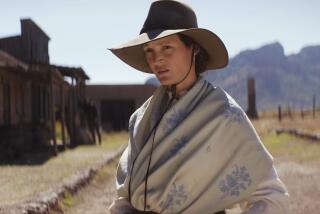‘The Road’
- Share via
“The Road” is a road you’ll wish hadn’t been taken. Not because anything’s been badly done, but because there’s a serious imbalance in the complicated equation between what the film forces us to endure and what we end up receiving in return.
Given that it’s based on Cormac McCarthy’s somber novel, winner of the Pulitzer Prize for a devastating report from the end of the world witnessed by a man who’s been there, it’s no surprise that the film is for the most part profoundly depressing.
What is disappointing is that despite numerous strong areas, including fine acting by Viggo Mortensen and young Kodi Smit-McPhee as father-and-son survivors of an unnamed apocalypse, what we’ve been given is no more than a reasonable facsimile, an honorable attempt at filming an unfilmable book.
As adapted by British playwright Joe Penhall and directed by John Hillcoat, best known for the slickly violent “The Proposition,” “The Road” turns out to be good at shocking and upsetting us, but it lacks the compensating emotional heft that would make absorbing those shocks worth our while.
For while Chris Kennedy’s formidable production design places us in an uncomfortably real space, absent McCarthy’s haunting language, “The Road” for the most part is not so good at transcendence, at making us feel, as the book definitely does, that there is reason for us to endure its pitiless descriptions of what Joseph Conrad described in “Heart of Darkness” as “the horror, the horror.”
What Conrad was likely talking about, and what “The Road” devotes considerable time to on the screen and on the page, is the terrors that humans inflict on each other. One of the provocative questions this story asks is whether staying alive is worth the savagely inhuman actions necessary to make survival possible.
Unwilling to begin on a totally downbeat note, “The Road” opens with what turns out to be a dream flashback to a time just before the unspecified catastrophe happens, a time when Mortensen’s unnamed man is married to Charlize Theron’s unnamed woman and their first child is on the way.
Ten years into the post-apocalypse, the mother is gone, the unborn child is a young boy (Australian actor Smit-McPhee) and the world has changed. It’s a blasted, blighted, ashen and slowly dying Earth, shaken by quakes, lighted by out-of-control fires and filled with dead cars, empty buildings, deserted bridges and very few people.
To stay alive in this world, you have to keep moving, wearing the most utilitarian rags you can find (Margot Wilson did the excellent costume design) and pushing the shopping cart that contains all your possessions. It’s a vision of a world largely without us that completely chills the soul.
The casting of Mortensen and Smit-McPhee is one of the film’s strengths. With straggly hair and a great wild look, Mortensen is convincing as a harried survivor, and the rapport he has with the more innocent and soulful child played by Smit-McPhee is excellent.
“I’ve never had a better acting partner,” Mortensen has said, “someone I knew had my back, and he knew I had his.”
One of the great fears of those few survivors is cannibalism, something the strong inflict on the weak, and scenes that hint at that are among “The Road’s” hardest to take.
The man’s greatest fear is that he will die before his son is old enough to protect himself, and the son’s greatest fear, paradoxically, is that he and his father will somehow lose the essence of their humanity in the drive to stay alive. “Are we still the good guys?” he asks his father plaintively. “Are we carrying the fire?”
This pair have their affecting moments, as does Robert Duvall as a kind of barely alive human lump, but absent McCarthy’s transformative prose, which has a power even images can’t improve on, what we are left with is more endurance test than anything more elevated.
If it is to do more than horrify and depress us, “The Road” is in need of a finer sensibility, and that is simply not on offer.
More to Read
Only good movies
Get the Indie Focus newsletter, Mark Olsen's weekly guide to the world of cinema.
You may occasionally receive promotional content from the Los Angeles Times.











